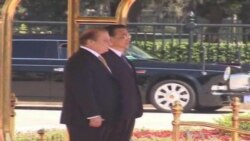China is one of Pakistan’s largest business partners, and more than 120 Chinese companies are doing business in Pakistan. This is despite the serious security risks Chinese nationals face in Pakistan.
During Pakistani Prime Minister Nawaz Sharif’s visit last month to China, the two countries signed several economic agreements that give Pakistan much-needed foreign investment. China will also benefit, says Derek Scissors of the Heritage Foundation.
"China gains two things. Employment for its workers for a while on these projects and revenue from the projects for the companies. That’s the commercial side. On the political side, Pakistan does need power. It does need a more consistent power supply that will help Pakistan’s economy and social stability," said Scissors.
China is also seeking Pakistan’s cooperation in curbing the militants that China says use Pakistani territory to launch attacks in its restive Xinjiang region.
"I think one of the foremost elements of this agreement is the understanding that Pakistan must combat, as far as China is concerned, the threat that is imposed from the East Turkestan Islamic Movement," said Aqab Malik, who is with Johns Hopkins School of Advanced International Studies.
Malik also says, in order to sustain long term economic growth, Pakistan must crack down on radicalism and extremism.
"Now [that] it has made economic agreements with China, there has to be some progress towards real counter-radicalization, counter-extremism programs, and there must be an off-the-fence, direct, stated goal that they are going to confront it. but actually implement it also," he said.
Anti-U.S. sentiments are high in Pakistan, and many see China as a counterweight to the United States as a trading partner. But relying too heavily on any one country may not be a good option for Pakistan. Derek Scissors:
"Diversification is good. It applies to the United States for Pakistan and it also applies to China. Being too heavily dependent on China would be a mistake," he said.
China-Pakistan bilateral trade was over $12 billion last year, and the leaders of the two countries have promised to increase it in years to come.
During Pakistani Prime Minister Nawaz Sharif’s visit last month to China, the two countries signed several economic agreements that give Pakistan much-needed foreign investment. China will also benefit, says Derek Scissors of the Heritage Foundation.
"China gains two things. Employment for its workers for a while on these projects and revenue from the projects for the companies. That’s the commercial side. On the political side, Pakistan does need power. It does need a more consistent power supply that will help Pakistan’s economy and social stability," said Scissors.
China is also seeking Pakistan’s cooperation in curbing the militants that China says use Pakistani territory to launch attacks in its restive Xinjiang region.
"I think one of the foremost elements of this agreement is the understanding that Pakistan must combat, as far as China is concerned, the threat that is imposed from the East Turkestan Islamic Movement," said Aqab Malik, who is with Johns Hopkins School of Advanced International Studies.
Malik also says, in order to sustain long term economic growth, Pakistan must crack down on radicalism and extremism.
"Now [that] it has made economic agreements with China, there has to be some progress towards real counter-radicalization, counter-extremism programs, and there must be an off-the-fence, direct, stated goal that they are going to confront it. but actually implement it also," he said.
Anti-U.S. sentiments are high in Pakistan, and many see China as a counterweight to the United States as a trading partner. But relying too heavily on any one country may not be a good option for Pakistan. Derek Scissors:
"Diversification is good. It applies to the United States for Pakistan and it also applies to China. Being too heavily dependent on China would be a mistake," he said.
China-Pakistan bilateral trade was over $12 billion last year, and the leaders of the two countries have promised to increase it in years to come.





